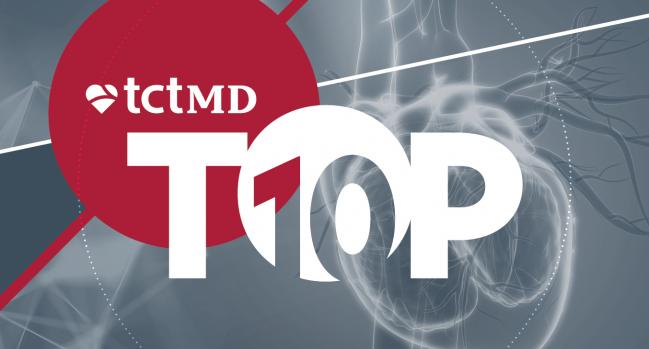TCTMD’s Top 10 Most Popular Stories for August 2020
Affirmative action and cannabis use took the top slots alongside more-typical cardiology news on hot topics like DAPT.

For the second month in a row, COVID-19 news has faded from TCTMD’s top 10—I’ll take this as good news, or at least a reprieve as all of us ready ourselves for the pandemic’s long haul. Our most-read stories in August touched on themes that extend beyond cardiology into broader societal issues: racism and affirmative action plus the health implications of cannabis use. Other big hits were more traditional, such as the publication of missing EXCEL trial data and articles on extended dual antiplatelet therapy, low-risk TAVR, reimbursement changes, drug-drug interactions, and the like. Amid all this is a COVID-focused story about arrhythmias—for our ongoing COVID-19 coverage, check out our dedicated hub as well as Todd Neale’s daily roundup.
 1. AHA, Editors, and Cardiologists Ask: How Did ‘Racist’ Paper Make It to Print?
1. AHA, Editors, and Cardiologists Ask: How Did ‘Racist’ Paper Make It to Print?
In a widely criticized JAHA white paper, now retracted, Norman Wang argues against affirmative action, saying it results in subpar doctors.
2. Cannabis Has No CV Benefits and Substantial Risks, Says AHA Statement
The authors call for more research, particularly in vulnerable populations, so that clinicians can be better informed.
3. Missing EXCEL MI Data Published, Prompting New Questions and Promised Answers
The risk of MI was higher with PCI when adjudicated using the Universal Definition, driven by higher rate of procedural events.
4. Analysis Supports Short DAPT Followed by P2Y12 Inhibitor Monotherapy After DES PCI
Extended-term dual antiplatelet therapy still has a role for those at higher ischemic risk but with a low likelihood of bleeding, the authors say.
5. Should Guidelines Support TAVR for Low-Risk Patients? Two Views
In a point/counterpoint, experts debate how and when low-risk TAVR should be included in guideline recommendations.
 6. Some Good News, Some Bad in Proposed 2021 CMS Reimbursement Changes
6. Some Good News, Some Bad in Proposed 2021 CMS Reimbursement Changes
While coverage is increased for telehealth, substantial cuts are anticipated for multiple surgical specialties.
7. Rosuvastatin-Canagliflozin Combo May Be Toxic, Case Suggests
A 76-year-old woman had a spike in rosuvastatin plasma concentrations after starting the SGLT2 inhibitor.
8. FFR Deferral of Nonculprit Lesions Riskier in ACS vs Stable Angina
The “physiological framework is entirely different” in ACS, with implications for borderline FFR values, Javier Escaned says.
9. Arrhythmias in COVID-19: New Review Tackles Mechanisms, Management
The virus or its treatments may disrupt heart rhythm, but the immune response and its targets likely deserve the most scrutiny.
 10. Super-Responders in COAPT: Improving MR and QoL Is Key
10. Super-Responders in COAPT: Improving MR and QoL Is Key
It’s no big surprise that getting a MitraClip predicted a good response in COAPT, but other signals also were intriguing.
* * *
All of TCTMD’s COVID-19 coverage—news, videos, and podcasts—can be found on our COVID-19 Hub.
Caitlin E. Cox is Executive Editor of TCTMD and Associate Director, Editorial Content at the Cardiovascular Research Foundation. She produces the…
Read Full Bio

Comments